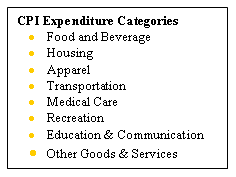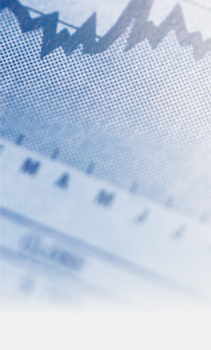 How
is Inflation (CPI) Measured? How
is Inflation (CPI) Measured?
The U.S. Government
measures inflation by identifying goods and services that represent
the economy and then determines a price for the “basket”.
The resulting price of the basket is represented by an index known
as the Consumer Price Index for All Urban Consumers1
(CPI). It then compares the price of the basket over time in order
to measure the movement of prices. The basket contains 200 categories
arranged into eight expenditure categories, which include food and
beverage, housing, apparel, transportation, medical care, recreation,
education and communication, and other goods and services. Taxes
that are directly associated with the specific goods are also included.
A rising CPI is an indicator of inflation, which leads to reduced
purchasing power for investors. As prices of goods and services
rise, your dollar will purchase less. For example, a gallon of gas
cost about 86 cents in 1970. Recently, travelers have paid more
than $3.00 per gallon. In order to combat inflation, the Federal
Reserve will increase short-term interest rates thereby making it
more costly for businesses and consumers to borrow money.
1 Additional
information about the Consumer Price Index can be found at www.bls.gov
|
